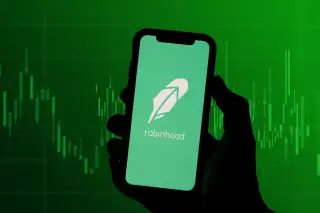Robinhood Users Will Soon Be Able to Trade 24 Hours a Day, 5 Days a Week

For the most part, investors have a six-and-a-half hour window to make real-time stock transactions. However, Robinhood is turning this schedule on its head, inviting its users to trade before and after the usual workday.
The investing platform is well-established for being on the cutting edge of stock trading, for better or for worse, ever since it came onto the scene in 2015 and popularized fee-free trading. Its coming offering, a 24-hour trading window, takes established after-hours precedents to a new level.
A blog post from Robinhood announced that next week, the platform will be implementing a "24/5" trading window.
Beginning on Sundays at 8 p.m., and lasting through Friday at 8 p.m., Robinhood users will be able to trade whenever they want to, with some exceptions — notably, what they can buy and sell.
As it stands currently, the new all-hours service extends to just 43 different individual stocks and exchange-traded funds, or ETFs. The all-hours service will be available for a small group of Robinhood users next Tuesday. Other customers can expect the full rollout sometime in June. As with its regular-hours trading, the overnight trades do not include any fees.
These offerings, according to Robinhood's announcement, were selected by monitoring the Blue Ocean Alternative Trading System (BOATS), a system operated by Blue Ocean ATS, which allows global traders to buy and sell U.S. stocks in extended hours. Additionally, Blue Ocean will be the partner to whom Robinhood routes its overnight trades as this service rolls out.
Robinhood says it monitored the BOATS for a 90-day period ending March 13, looking for the investments with the highest overnight trading volume to inform its own offering. While the full list of extended-hour assets isn’t yet available, the post notes Apple, Tesla and Amazon are among the 24-hour stocks.
One noteworthy caveat to this experiment is that Robinhood’s overnight trading services only permit limit orders — orders in which users must declare a per-share price for their transaction to be triggered. These orders are not completed as quickly as market orders, in which an investor makes a transaction at any time based on the most current going-rate for their investment.
This is because during after-hours trading, there's not much volume, so trades can precipitate massive price fluctuations; limit orders are a way for the company to mitigate some of the risk investors take on during these late hours by having them explicitly set their buy and sell prices.
This is not to say that limit order trading mitigates all risks involved in after-hours trading. There are still issues of lower liquidity and unlinked markets displaying price information that's not completely up to date, among others.
What it means for investors
Trading outside of Wall Street’s hours of operation isn’t an entirely new concept. The New York Stock Exchange began offering extended hours for some investors in the 1990s, and the concept stuck.
However, Robinhood’s new service makes the company the first U.S. retailer to offer 24-hour access to individual stock trading. It's worth noting that competitors to the company have their own overnight trading services. For example, E*Trade and TD Ameritrade offer this for some customers already. But, these offerings only extend to select ETFs.
The news makes for quite a leap from the platform’s previous 13-hour window, which included pre-market trading from 7 a.m. to 9:30 a.m. and post-market hours from 4 p.m. to 8 p.m. As the company notes in its announcement, this will be a major convenience to both traders who work odd hours or have busy schedules as well as those who suffer from living outside of EST-centric trading hours.
Of course, the company is no stranger to setting new precedents that challenge its e-trading competitors to match. Robinhood popularized the “fee-free” payment for order flow trading model when it first released in 2015. Since then, this model has become an industry standard for retail trading apps. It was also among the first to embrace crypto trading.
More from Money:
Scared by Stock Volatility? Moving Investments to Cash Can Backfire in a Big Way
Human Stock Traders Still Have an Edge Over Robots at the NYSE: Study
‘Buy the Dip’: Why the Investing Strategy Is Making a Comeback